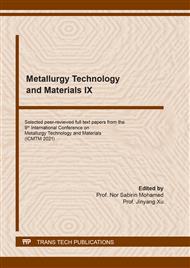[1]
E. Axinte, Metallic glasses from alchemy, to pure science: Present and future of design, processing, and applications of glassy metals, Materials & Design. 35 (2012) 518-556.
DOI: 10.1016/j.matdes.2011.09.028
Google Scholar
[2]
K. Zhang, X. F. Bian, Y.M. Li, et al. New evidence for the formation and growth mechanism of the intermetallic phase formed at the Al/Fe interface, J Mater Res. 28.23 (2013) 3279-3287.
DOI: 10.1557/jmr.2013.345
Google Scholar
[3]
F.Q. Zu, Y. Xi, R.R. Shen, Effects of compound formation on liquid structure in Cu-Sn melts as a function of temperature, Physics and Chemistry of Liquids. 44 (2006) 543-550.
DOI: 10.1080/00319100600757458
Google Scholar
[4]
U. Kaiser, D.A. Muller, J.L. Grazul, et al. Direct observation of defect-mediated cluster nucleation, Nature Materials. 1.2 (2002) 102-105.
DOI: 10.1038/nmat729
Google Scholar
[5]
Y.Y. Liu, L.W. Jiang, et al, Study on molten structure of Ni3Al alloy by high temperature X-ray diffraction, Journal of Materials Engineering. 1 (2009) 263-266.
Google Scholar
[6]
X.D. Wang, et al, Applications of synchrotron radiation-based techniques in studying the structure and properties of disordered alloys, Physics. 38.7 (2009) 485-489.
Google Scholar
[7]
F.X. Guo, Study on the correlation between electqrical resistivity and structure in superheated and undercolled melts, Jinan, Shandong University. (2013).
Google Scholar
[8]
S. Jing, X. Chen, S. Nishimura, et al. Density of molten calcium fluoride, Journal of crystal growth. 237 (2002) 1797-1801.
DOI: 10.1016/s0022-0248(01)02345-4
Google Scholar
[9]
Y. Zhao, J.G. Qi, et al. Molecular dynamics simulation and application in the research of metal melt structure, Heat treatment of metals. 31.1 (2006) 13-16.
Google Scholar
[10]
S. Wu, M.J. Kramer, X.W. Fang, et al. Structural and dynamical properties of liquid Cu80Si20 alloy studied experimentally and by ab initio molecular dynamics simulations, Physical Review B. 84.13 (2011) 1-7.
Google Scholar
[11]
A. Pasturel, E.S. Tasci, M.H.F. Sluiter and N. Jakse, Structural and dynamic evolution in liquid Au-Si eutectic alloy by ab initio molecular dynamics, Physical Review B. 81.14 (2011) 1-4.
DOI: 10.1103/physrevb.81.140202
Google Scholar
[12]
J. F. Wax, M. R. Johnson, L.E. Bove and M. Multiscale, Study of the influence of chemical order on the properties of liquid Li-Bi alloys, Physical Review B. 83.14 (2011) 1-11.
DOI: 10.1103/physrevb.83.144203
Google Scholar
[13]
M. Joshi, M. Kumar, P.N. Gajjar, et al. Electrical resistivity of liquid Al-Mg binary alloys. Advanced Materials Research. 665 (2013) 76-79.
DOI: 10.4028/www.scientific.net/amr.665.76
Google Scholar
[14]
Z.Y. Hou, L. X. Liu, R.S. Liu, et al. Short-range and medium-range order in rapidly quenched Al50Mg50 alloy, Journal of Non-Crystalline Solids. 357.5 (2011) 1430-1436.
DOI: 10.1016/j.jnoncrysol.2010.11.014
Google Scholar
[15]
H. Lou, X. Wang, Q. Cao, et al. Negative expansions of interatomic distances in metallic melts, Proceedings of the National Academy of Sciences. 110.25 (2013) 10068-10072.
DOI: 10.1073/pnas.1307967110
Google Scholar
[16]
Y. Li, W.Z. Chen, B.S. Dong, S.X. Zhou, Effects of metalloid content on viscosity of Fe-Si-B-P-C alloy melt, Journal of Non-Crystalline Solids. 490 (2018) 31-34.
DOI: 10.1016/j.jnoncrysol.2018.03.042
Google Scholar
[17]
X.D. Bao, et al. Change of Al-6% Cu alloy melt structure and influence of it on solidification microstructure, Hot working technology. 43.3 (2014) 12-15.
Google Scholar
[18]
L. Song, Study on the structure of pure metal and binary alloy melts. Jinan, Shandong University. (2020).
Google Scholar
[19]
M.X. Wang, P. Jia, H.R. Geng, et al. Study on the microstructure and liquid–solid correlation of Al–Mg alloys, Physics and Chemistry of Liquids. 54 (2015) 507-514.
DOI: 10.1080/00319104.2015.1121784
Google Scholar
[20]
L. Yang, Clusters types in metal melts and their roles during solidification process. Jinan, Shandong University. (2012).
Google Scholar
[21]
C. Li, Z.Y. Hou, et al. Simulation study on the nucleation and evolution processes of nuclei during the solidification of Ti3Al alloy, Acta Physica Sinica. (2021) 1-18.
Google Scholar
[22]
Y.F. Mo, Z.A. Tian, R.S. Liu, et al. Structural evolution during crystallization of rapidly super-cooled copper melt, Journal of Non-Crystalline Solids. 421 (2015) 14-19.
DOI: 10.1016/j.jnoncrysol.2015.04.026
Google Scholar
[23]
L.H. Xiong, Structural evolution and thermodynamic properties of metallic and glasses studied by ab initio molecular dynamics simulations. Hangzhou, Zhejiang University. (2016).
Google Scholar
[24]
H. Qu, W.D. Liu et al. Melt structure and formation of main strengthening phases in Al-Fe-Ce alloy with EET theory, Rare metals. 44.9 (2020) 1003-1008.
Google Scholar


